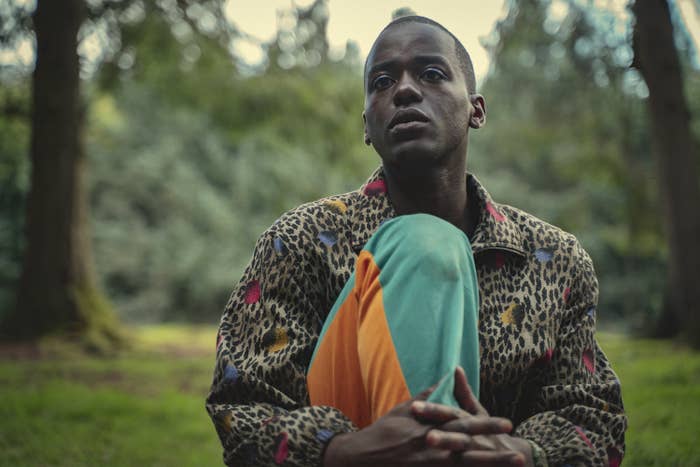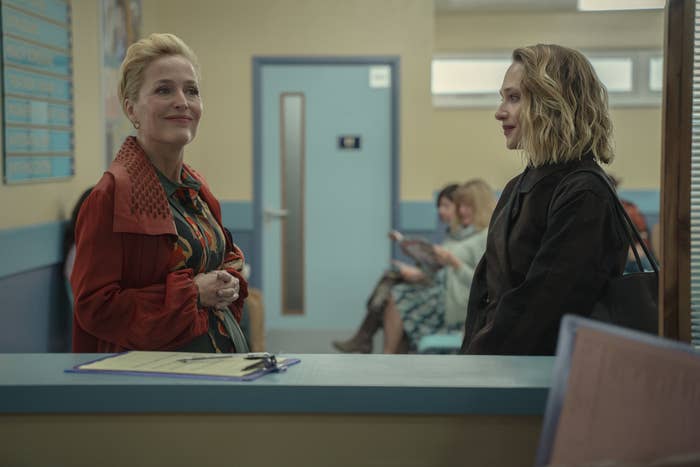
After a year-and-a-half-long wait, the horniest show on television is finally back.
Sex Education, the hit Netflix series created by Laurie Nunn that follows a diverse group of British teenagers as they discover the joys — and oftentimes, awkwardness — of sex and relationships, returns to the streaming giant on Friday with its third and arguably best season to date.
There’s an air of maturity that sets this season apart from the show’s previous ones. While there are moments of raunchiness that fans will surely appreciate, the series has toned down some of its more explicit sex scenes, opting for more heart and emotional awareness, the writers fleshing out beloved primary and secondary characters in ways that feel natural. The end result is a season that is affirming, inclusive, relatable, and smart. Spoilers ahead.
Unsurprisingly, the season premiere starts with a hot and heavy opening scene. Set to the Rubinoos’ cover of “I Think We’re Alone Now,” we watch a swift montage of characters engage in different kinds of sex. There’s Otis (Asa Butterfield) fucking in a car in a secluded wooded area with a woman whose legs are flailing in the air, face obscured. Eric (Ncuti Gatwa) and his former bully–turned-lover Adam (Connor Swindells) kiss and rip their clothes off, followed by shots of couples — of all different shapes and sizes — getting down. The over-the-top scene ends with every character displaying their satisfied, euphoric O-faces. “That was so great,” says a character named Dex (Lino Facioli), right after climaxing. “It was okay,” his partner replies. “I didn’t come, though.” She then lists the names of guys who have made her orgasm, kisses Dex on the cheek, and leaves. Alone, he says to himself, “Am I bad at sex?”

Dex’s question hints at what’s to come throughout the season: allaying characters’ fears about properly pleasing their sexual partners, as well as accepting that everyone’s genitals are unique and not something to feel insecure about. Some problems from Season 2 linger, most notably the chlamydia outbreak at Moordale Secondary, which proves to have serious repercussions for students in Season 3. A new headmaster named Hope (Jemima Kirke) joins the school. Tasked with turning around the school’s sullied reputation, Hope wants the institution to be seen as more than just “the sex school.” But her ideas for improving the school are prescriptive, stifling students’ creativity and self-expression. Kirke’s Hope is this season’s villain, but even she gets a backstory that prevents her from being one-dimensional. She’s the perfect foil to the students as they navigate school and continue to come into their own as individuals.
Impressively, the series tackles a swath of hefty topics this season.
Impressively, the series tackles a swath of hefty topics this season, providing each with enough room to breathe, adequately addressing them in a manner that feels sufficient. Jean (Gillian Anderson) grapples with unsolicited opinions about her geriatric pregnancy. In addition to her still-gestating bundle of joy, Jean agonizes over telling her most recent sexual partner Jakob (Mikael Persbrandt) that he is likely the father, after breaking his heart last season when she kissed her ex-husband. Jean and Jakob epitomize the messiness of older adults who have unconventional approaches to romantic life. The never-ending will-they/won’t-they saga between Otis and Maeve (Emma Mackey) reaches new heights, but not without a few frustrations.
But the best episode this season, hands down, focuses on Gatwa’s Eric Effiong as he travels with his family to Nigeria for a wedding. Over the course of three seasons, Eric went from a closeted Black boy who guarded the most radiant parts of himself, largely from his family, for his own safety to one of the most fearless characters in the series. In Season 3, he basks in the comfort of being out to his immediate family, as well as a blossoming though sometimes embarrassing relationship with his boyfriend, Adam. Adam has hang-ups about his own sexuality (he’s not out to his mother or father), most of which are normal and make sense because he’s not as far along in his journey as Eric.
While on the trip to Nigeria, Eric’s mother asks that he tone down his exuberant personality because she wants to keep her son from encountering danger. At the wedding Eric meets a fellow queer guy named Oba (Jerry Iwu), and they travel around Lagos together, eventually locating a place uninhibited by oppressive attitudes, where they dance the night away. It’s a stunning episode, capturing what it feels like to be in a country that does not recognize LGBTQ rights while illustrating how resourceful queer people are in those spaces. The episode not only gives Eric a greater understanding of himself, it challenges his relationship with his mother and ways in which lies — usually told for the sake of preserving family tradition — chip away at the authenticity of a person. It’s a deeply moving part of the series, and easily some of Gatwa’s best work on the show to date.
The show also explores nonbinary identity. In Episode 4, right after the new headmaster implemented uniforms for all students to wear, the new head girl, Viv (Chinenye Ezeudu), instructs students to split into groups — boys and girls. This of course causes an issue for two nonbinary students who don’t fit into either category. “You can both go in the girls’ line,” Hope says dismissively. “But I’m not a girl,” says one character named Cal (Dua Saleh). “They’ll be discussing female anatomy in this class, which I’m sure will help you,” Hope answers. The exchange captures how reductive the gender binary can be, how limiting it is. Though aimed at teens, it’s clear that Sex Education could be an instructive television viewing experience for adults who have antiquated ideas about sex and gender. In a world where defying gender norms isn’t always met with enthusiasm, witnessing the show portray characters who handle difficult situations, like this one, feels refreshing. That the show manages to come off as not being too preachy or didactic is even more remarkable.
Sex Education, once again, masters the difficult undertaking of being both entertaining and enlightening. Though the series as a whole has been acclaimed by critics for its cringingly honest approach to a subject that is difficult for most people to talk about, Season 3 is in a class of its own, a practically perfect piece of television from beginning to end.●
